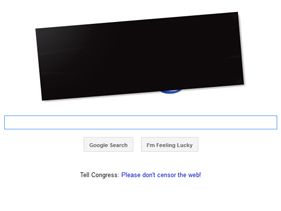Thousands of sites blacked out to protest SOPA legislation. By Gil Kaufman Google’s homepage to protest web piracy bills Photo: Google A big black bar over the typically animated Google home page logo. No quick searches on the English-language Wikipedia. Those two internet giants are among the nearly 7,000 sites that voluntarily went dark or posted calls to action on Wednesday (January 18) in a protest against the U.S. House of Representatives’ Stop Online Piracy Act and the Senate’s similar Protect IP Act. The Act is designed to prevent online piracy and copyright infringement by giving the government and large corporations the ability to shut down sites accused of copyright infringement without a trial or hearing. The point of the legislation, according to the Washington Post is to stop foreign web sites that sell pirated and counterfeit goods by imposing restrictions that would force U.S. companies to stop selling online ads to suspected pirates, processing payments for illegal online sales and refusing to link to sites suspected of piracy in search-engine results. “There’s no fundamental First Amendment right to engage in thievery. Nor to advertise thievery,” said Motion Picture Association of America spokesperson Howard Gantman. A few days before the blackout action, Republican Texas Congressman Lamar Smith told Reuters that he did not understand why the protesters were so adamant about protecting offshore operators. “It is amazing to me that the opponents apparently don’t want to protect American consumers and businesses,” Smith said. “Are they somehow benefiting by directing customers to these foreign websites? Do they profit from selling advertising to these foreign websites? And if they do, they need to be stopped. And I don’t mind taking that on.” Among the sites that are participating in Wednesday’s protest: Reddit, Mozilla, WordPress.org, MoveOn.org, TwitPic, BoingBoing, Flickr, the Cheezburger network and Epic Games. Though many major Hollywood movie studios, record labels and networks such as Viacom (MTV News’ parent company), NBC-Universal and Fox News have given support to the legislation, web experts have warned that it could severely cripple the ability of the internet to function by adding huge new costs and rules that would seriously restrict the freewheeling personality of the ‘net and stall innovation. As an example, they say that if an crowd-sourced site like Wikipedia posts an item that links to a site that provides access to copywritten material it could result in sanctions or a takedown of Wikipedia. In essence, it would require tech companies to take a fine-tooth comb to sites bursting with user-generated content. They’ve also objected to a provision that would remove the rogue sites from the internet’s virtual phone book, so that if a U.S. user put in that web address it would seem as if the site didn’t exist. “Imagine a world without free knowledge,” read the Wikipedia home page on Wednesday morning. “For over a decade, we have spent millions of hours building the largest encyclopedia in human history. Right now, the U.S. Congress is considering legislation that could fatally damage the free and open Internet. For 24 hours, to raise awareness, we are blacking out Wikipedia.” Members of Congress have been taken aback by the visceral reaction from technology companies and online users, who may have already made headway in stalling the legislation. Just weeks after both bills seemed close to passage, Senate Democrat leaders have said they will not vote on a version of the bill opposed by many of the tech companies and are seeking a slow down of passage and possible revision of their bill. The White House has also signaled that it is concerned about the phone book provision in the bills, which its sponsor said they plan to remove. Several major opponents have submitted a counter proposal that would allow them to police themselves with oversight by an international nonprofit that hunts down online rogues. Editor’s note: Viacom, the home of MTV Networks, continues to be in support of SOPA.

Read the original post:
Google, Wikipedia Go Dark In Protest
























